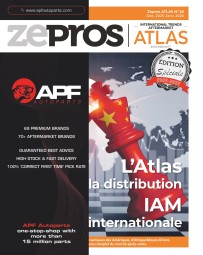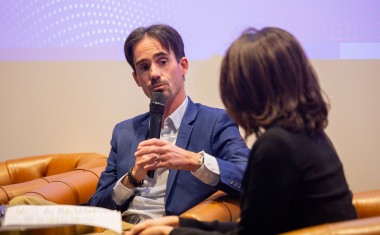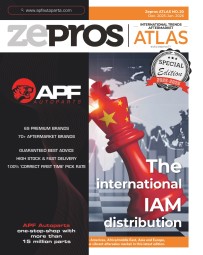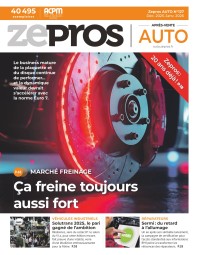
F. Delion, Renault: “Creating lasting value in today’s volatile environment”

At the heart of François Delion’s challenges: going after values for the aftermarket. Renault's global aftersales director, provides insights into these developments.
Results for 2024: how did your aftersales business fare commercially?
François Delion: We achieved growth above 5%*, which was the rate we recorded in 2023 and also our target for 2024. Against the backdrop of a new vehicle market that has declined significantly since COVID-19 and a sales policy that prioritises value over volume, our parc is shrinking slightly and ageing, but we are doing all we can every day to bring more value to the aftermarket. We're going after this value with increasing penetration by age group, which means we can maintain the flow of workshop business to our dealerships despite this decline in the fleet. At the same time, we need to maintain our service capacity, despite the difficulties we're experiencing with personnel shortages - a problem that affects the entire industry. To do this, we're looking to increase productivity by concentrating operations, particularly in heavy mechanical work, bodywork and the back office, but also by working to improve vehicle reparability and harnessing new technologies such as connectivity and AI assistance to reduce workshop hours. Network concentration is a ‘must’ for productivity and maintaining the highest standards, but maintaining our aftermarket capillarity is also a commercial advantage, and the Group remains vigilant on this point. Customers who have been made loyal through aftersales services are more likely than others to want to buy a new car from us. Working on loyalty and capillarity is therefore a natural point of convergence with our distributors.
Are service contracts still the ‘Trojan horse’ to extract this value?
F. D.: It is an essential loyalty-building tool at a time when the number of new vehicles is falling, but also when the vehicle fleet is ageing. All the manufacturer networks are focused on the 0-10 year old segment. We have been working on this retention for years, selling thousands of new vehicle service contracts for our Renault and Dacia brands. Today, we are replicating this model on the used car market with Renew, where this year we attained a penetration rate of one vehicle in five. We are also addressing the workshop channel, where we are offering our customers the chance to sign up to monthly payment packages when they receive their invoice... This package was launched this year in France and has already won over tens of thousands of Renault and Dacia customers for whom the contracts signed when they bought their vehicle had expired.
In the four zones where the group is established, which are the most dynamic in aftersales?
F. D.: Europe remains our main market, with buoyant sales and aftermarket business, thanks to our established market share. South America had a tough year economically, with contrasting fortunes from one country to another. Asia was stable, and even grew slightly, thanks to good penetration of services, despite the decline in our major parcs (Korea and India), which are aging organically. Lastly, the EMEA region saw strong growth in value terms, in an uncertain geopolitical climate.
Can you give us an update on Motrio and its country penetration?
F. D.: We have recorded net growth of 200 outlets across Europe and North Africa, bringing the total to over 2,500 service points, and double-digit growth in parts. We are developing the network with improved support (technical training, digital tools, documentation, etc.) and a range of parts that is being expanded by ten new SKUs a day. The Motrio network is now well established in France, Italy and Spain. We also have around a hundred sales outlets in Poland. North Africa is developing unevenly, between Algeria, where Motrio is a great success and has become one of the leading multi-brand networks, and Morocco, where we have a long way to go in a country where our brands account for 40% of new vehicle sales, but we are still working on finding the right recipe for Motrio.
The UK market remains difficult, but we are launching a new dynamic, while Germany is now at a standstill and is likely to remain so in the very short term. The master franchise we announced to develop the network is just getting off the ground. Our sights are also set on South America, with a good start in Argentina and an open door in Brazil. Even though we are still small in this market, the points we have won on the IAM will enable us to add them to the total cumulative value of our aftermarket business.
Does the partnership between the Motrio, Goodyear and Castrol networks still exist?
F. D.: Our trial in Spain, with around forty workshops from three respective networks, produced really positive feedback on the ground. We had found some good ways of generating business between Motrio, Goodyear and Castrol. But we didn't manage to find commercial common ground to invest and roll it out globally. We have officially put the matter on hold. That said, we're maintaining our relationship because we're good partners on other issues.
More broadly, we are open to all forms of collaboration. We have the example of Exadis (with Mobivia), which has been working very well in France for several years. We are partners with distributors in Spain and Italy. We will always pursue this approach whenever a partnership brings value to all concerned. And if it doesn't, we'll explore new opportunities to find a better solution to meet the needs of the market. I believe that responsiveness and the ability to transform rapidly are two essential values if we are to continue to create lasting value in today's volatile environment.
*9-month YTD results: Group sales: €37.7 bn (+ 0.8 %) / Car sales: €33.7 bn (-1.5 %).










